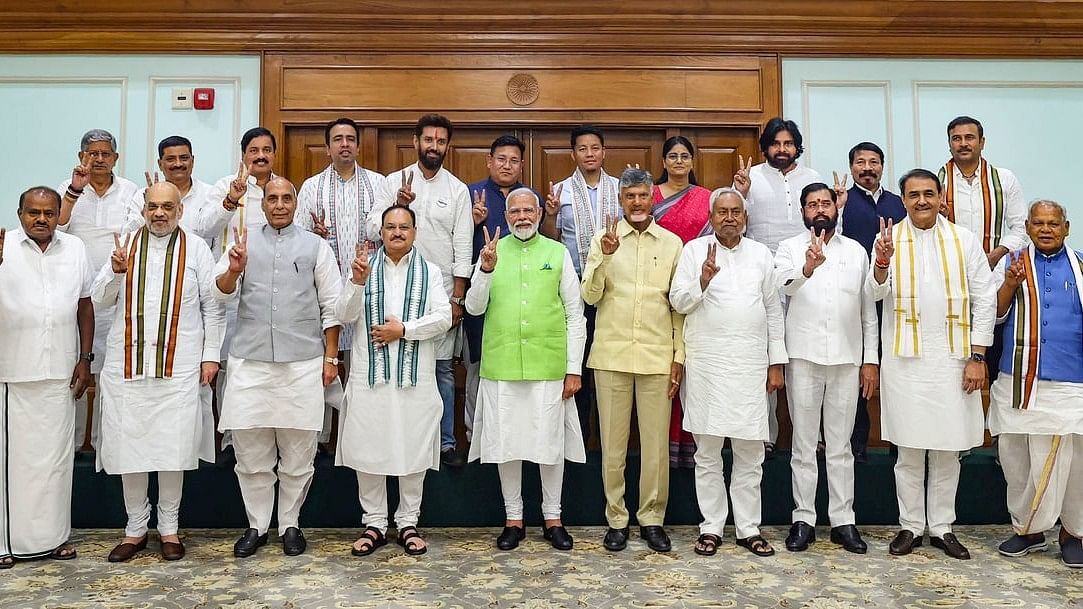
Prime Minister Narendra Modi with BJP President J P Nadda, TDP chief N Chandrababu Naidu, JD(U) chief Nitish Kumar and other leaders during a meeting of the National Democratic Alliance (NDA) at PM's residence, in New Delhi, on Wednesday.
Credit: PTI Photo
The results of the 18th Lok Sabha elections are out. The BJP has been chastened by mature sovereign voters by denying it a majority. As the single largest party, it will head the NDA Coalition government. Here is an attempt to identify some focus areas for the new government.
At the outset, a few words about the historic election that has gone by. Firstly, the voters conveyed in clear terms that they do not endorse the communal polarisation unleashed by Modi during the election campaign. There can be no better proof of that than the way the voters decided to inflict a massive defeat on the BJP in Uttar Pradesh. The party got only 33 seats, four less than the Samajwadi Party. Even in Faaizabad, which includes Ayodhya, the BJP lost to the SP candidate, with the electorate rejecting the saffronization plank despite the Ram temple factor. The defeats of Smirti Irani in Amethi and the BJP candidate in Rae Bareli reflect the strong sentiments of the electorate there.
Secondly, in Maharashtra, the BJP got only 9 out of a total of 48 seats, with the voters deciding to punish it for dividing the NCP and the Shiv Sena to serve its narrow political ends.
Thirdly, in West Bengal, the BJP was reduced to 12 from its earlier tally of 18, with the voters standing solidly behind Mamta Banerjee. All in all, Modi’s dream (and slogan) of the party getting 370 seats and the NDA crossing 400 was shattered. With the BJP getting only 240 seats, it is forced to lead a coalition government. In one sense, the much-talked about Modi equaling Nehru’s record of three terms, though technically right, is not politically correct, as he would be heading a coalition government only. Nehru led majority governments all three times.
The coalition government that would be sworn in will have to, first of all, agree upon a Common Minimum Programme (CMP), which should be implemented in all earnestness. Such a CMP will have to include the non-controversial components of the BJP manifesto and significant aspects of the manifesto of allies. Senior leaders such as Chandrababu Naidu and Nitish Kumar must ensure such compliance by the BJP.
The coalition government should establish the highest traditions of parliamentary democracy, keeping in mind that the mandate is not for single-party rule. Prime Minister Modi should be made to attend Parliament sessions without fail, listen to the members, and pave the way for a harmonious running of the sessions. The government must ensure that the bills it introduces, especially ones with national ramifications, are discussed in the Parliamentary Committees to accommodate the concerns of the opposition members. The practice of holding joint press conferences by the PM and his senior colleagues should be initiated.
As Chief Minister of Gujarat, Modi got higher allocations from the UPA government for the developmental programmes of the ate. As the head of the coalition, he should listen to the chief ministers, particularly those of the opposition-ruled states. The effort should be to sincerely promote cooperative federalism by transferring the states’ share of revenue from tax collections, including GST collections, and a higher allocation of the Centre’s resources for the overall development of states, more specifically, the backward among them. The dictum “a strong Centre together with strong states” should be accepted as the overriding guiding principle of a genuine federal polity. As for the much-needed policy changes, the BJP-led NDA government should prioritise job creation in urban and rural India by coming up with specific time-bound plans. Jobs that are lying vacant in various departments of the central government and centrally funded institutions need to be filled expeditiously.
Furthermore, the woes of the poor and the middle class hit hard by the price rise, and food inflation needs priority attention by the government through price regulation.
Additionally, demands for special packages by the coalition partners will have to be handled deftly without casting too much burden on the
central exchequer.
The I.N.D.I.A alliance put up a creditable performance in the elections, though it could not unseat the Modi government. It should now function cohesively and play the role of a responsible opposition. The Congress Party will get Leader of the Opposition (LoP) status by virtue of its numbers. It will have a special responsibility to keep the government on its toes.
(The writer is a former professor of political science, Bangalore University)